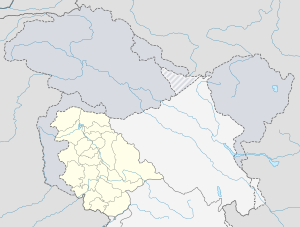2016 Uri terror attack
| 2016 Uri attack | |
|---|---|
| Part of the Insurgency in Jammu and Kashmir | |
|
Location in Jammu and Kashmir, India
|
|
| Location | Near Uri, Baramulla district, Jammu and Kashmir, India |
| Date | 18 September 2016 5.30 am (IST) |
|
Attack type
|
Terrorism, mass shooting |
| Weapons | 4 AK-47 rifles, 4 under barrel grenade launchers, 5 hand grenades, 9 UBGL grenades |
| Deaths | 23 (19 soldiers, 4 attackers) |
|
Non-fatal injuries
|
19–30 |
|
Suspected perpetrators
|
Jaish-e-Mohammad (suspected) Lashkar-e-Taiba (claimed) |
| Defenders | |
The 2016 Uri attack was an attack by four heavily armed terrorists on 18 September 2016, near the town of Uri in the Indian-administered state of Jammu and Kashmir. It was reported as "the deadliest attack on security forces in Kashmir in two decades". The militant group Jaish-e-Mohammed is suspected of being involved in the planning and execution of the attack. At the time of the attack, the Kashmir Valley region was at the centre of unrest, during which 85 civilians were killed and thousands injured in clashes with security forces.
Since 2015, the militants have increasingly taken to high-profile fidayeen attacks against the Indian security forces: in July 2015, three gunmen attacked a bus and police station in Gurdaspur and earlier in 2016 4–6 gunmen attacked the Pathankot Air Force Station. Indian authorities blamed Jaish-e-Mohammad for the latter attack.
Also, since 8 July 2016, the Indian state of Jammu and Kashmir has been undergoing continuous unrest following the killing of Burhan Wani, a militant leader popular with the youth in the state. The killing sparked violent protests against the Indian government in the valley, leading to the protests being described as the "largest anti-India protests" against Indian rule in recent years.
During the protests, at least 87 civilians have been killed. Thousands have been injured, including several Indian security personnel. The violence has been described as the worst since 2010. The Indian security forces have been criticised by Amnesty International and Human Rights Watch for using excessive force.
...
Wikipedia


